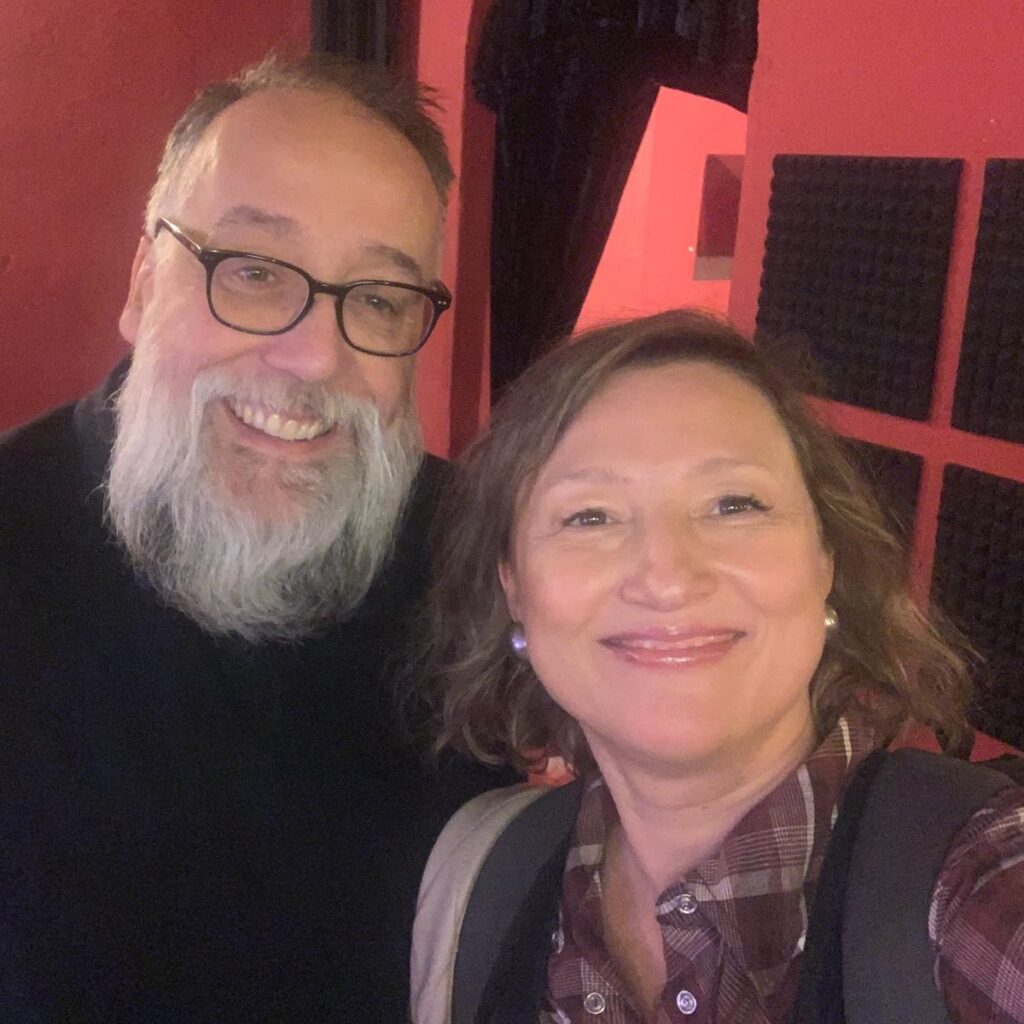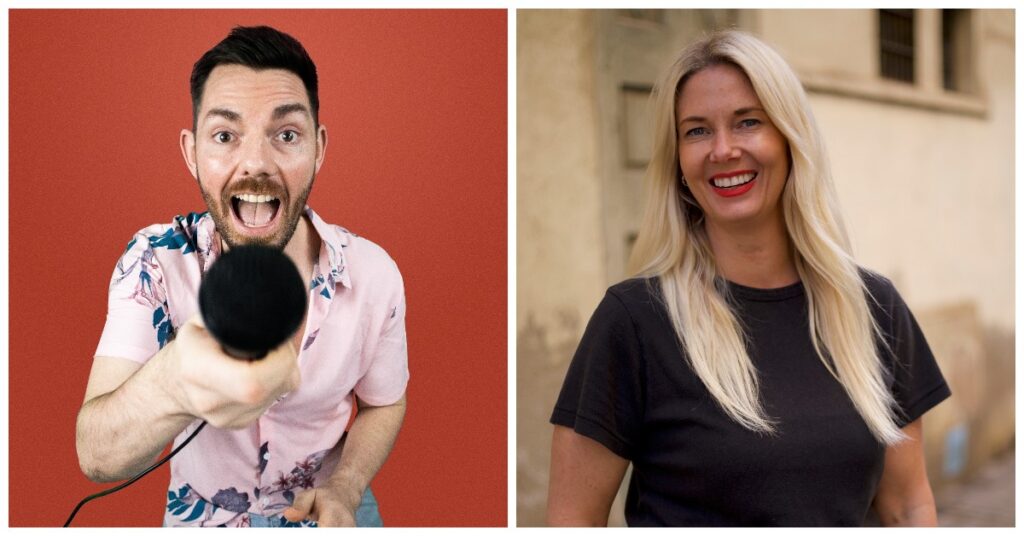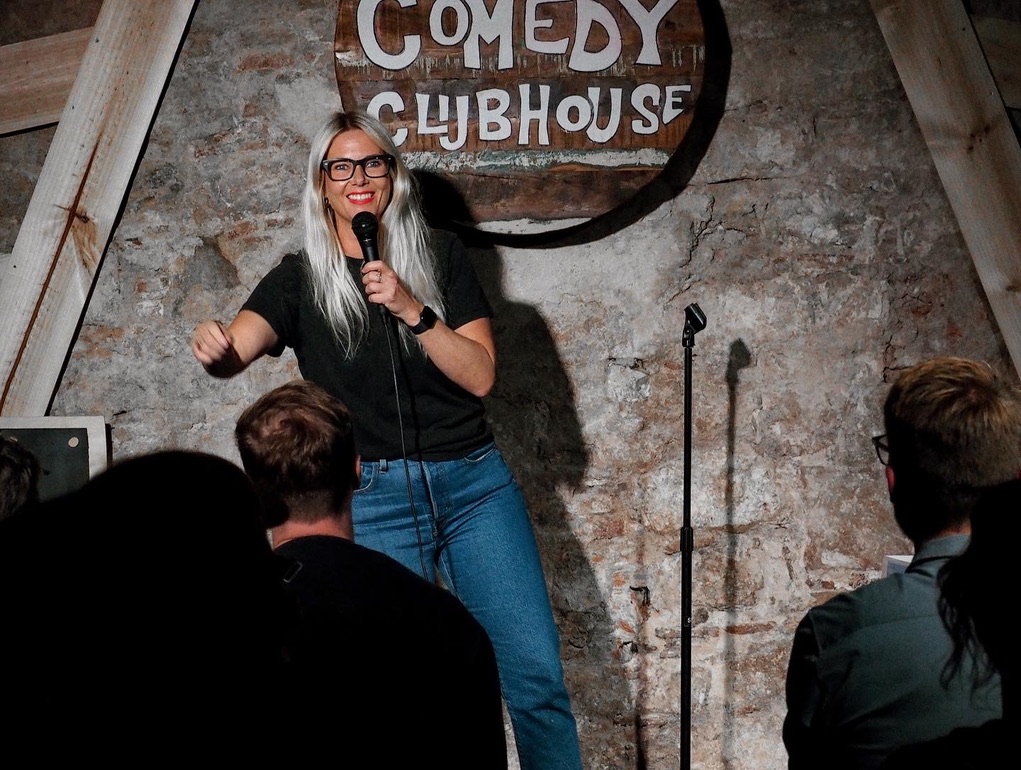‘BCN Comedy Vibes: Fringe Edition with Chris Groves’ by Yulia Peelovesky
In this interview, we sit down with Chris Groves, a “comedy dad” who has been nurturing budding comedians for 15 years through his Find Your Funny Stand-Up course. With his wealth of experience on stage and in teaching, Chris shares his candid thoughts on the craft of comedy, including an eye-opening distinction between comedy and therapy—believe it or not, they aren’t the same! He also offers invaluable wisdom to those hesitant to step on stage, addressing the fears and doubts that hold many back from pursuing the laughter-filled world of stand-up comedy.
Yulia: So, Chris, you’ve been cracking people up in Barcelona for years. When you first started, did you ever think you’d still be here, co-owning a comedy club and introducing so many people to the art of stand-up? What keeps you hooked?
Chris: I’ve been here for 28 years. I started comedy about 16 years ago. I don’t keep track of how many times I’ve been on stage. I did it for a while and then started running the comedy courses. The courses keep me interested—always new people, always new things.
Yulia: Did you go to a comedy course yourself?
Chris: Yes, I did a weekend comedy course here with Logan Murray, who I always quote in my courses. It was part of the Giggling Guiri Festival. I can’t remember the year exactly, but I’d already started doing stand-up about six months before that. The course changed the way I thought about comedy, and I really enjoyed it. Two years later, when Logan came back, I helped him with the course —basically I got to retake the workshop while helping out with logistics.
Yulia: Was it mainly for inspiration?
Chris: Yes. Not that I needed more tips, but I got to know him, and he wanted a bit of help. It was done in a space where I was doing shows, so I was involved. Then, at one point, Logan suggested I do a course myself. I hesitated since everything I did was based on what I learned from him. But he said that’s fine as long as you acknowledge it. Over the years the course has developed, it became very much my own thing and I now even co-run it with Mauricio Lombardi, but at the start of the course I still always say, I’m using this from this comedian, that exercise from another.
Yulia: How is he doing now?
Chris: He’s still traveling a lot, running courses. He was part of the UK stand-up scene in the ’80s when it was first starting, and now his main focus is on the courses.
Yulia: How are you feeling about the Barcelona Fringe? What’s on? Anything you’re sick of? Any recommendations?
Chris: If I were a normal person with time, I’d approach it like a real Fringe experience—go to places, walk in on things you don’t know. Surprise yourself. That’s the essence of The Fringe for me.

Yulia: Is it okay to go by show names even if you don’t know the comedians?
Chris: Absolutely. That’s what The Fringe is about. There are around 200 shows this week in Barcelona, and most people won’t know the comedians. Just look at the description and go—or don’t read anything and just go! Maybe check the language first, as we had people show up expecting English shows that were in Spanish.
Yulia: Secret Comedy Club hosted over 27 shows during the festival. If you had to describe The Fringe energy in one punchline, what would it be?
Chris: “We can do it; we’ll get through it.” That sums it up from both a performer and venue runner’s perspective. We’ve got everything—venues, ticket platforms, performers, audience—and it’s only the first year. It’s going to grow.
Yulia: Where do you see The Fringe in five years?
Chris: I hope it grows and stays multilingual, involving Spanish comedians and audiences. If it gains recognition from the local council, it could really flourish.
Yulia: You’ve performed in English, Spanish, and Catalan, and even brought comedy to Ukrainians, which led to the stand-up community, Tu! What’s the funniest or most bizarre cultural misunderstanding you’ve experienced?
Chris: It’s hard to remember, as the funniest things happen in the moment. Misunderstandings become comedy on stage but don’t always stick in memory.
Yulia: Do you translate your jokes?
Chris: Yes, I do most of the same material. Sometimes I write it in English and translate it to Spanish, or vice versa, depending on the next show. It’s mostly straightforward to translate—except for puns, which are tricky. But most of my material is just talking about silly things, and those translate well.
Yulia: Let’s talk about your Find Your Funny Stand-Up Course. You’ve worked with a lot of aspiring comedians. You nurture their unique humour, right? Do you remember any special, unique first attempts at comedy from your past? Without names of course.
Chris: Unique… Ok, I won’t name names, but one stands out. The first time they came, I’d never seen them before. They joined a few weeks into the course when people were already showing material on stage. This person came in, and we asked if they had anything written or wanted to try. They said yes and went on stage.
After knowing everyone for one hour, their bit involved pretending to fist themselves, hand down their trousers and all. We laughed, but we also thought maybe it was quite ambitious for a first time on stage. Definitely memorable.
Yulia: As a dad and a comic, have your daughters inherited your humour genes, or do they roll their eyes at your jokes and tell you to keep it on stage?
Chris: I think they got the humour gene. My youngest daughter is outgoing, always joking and being silly. The older one has a dry, sarcastic, darker sense of humour. Both of them have come to see shows when they can. My older daughter enjoys it; my youngest is now old enough to attend some shows too. They’ve gotten used to hearing jokes about themselves. Most of it isn’t harsh, and they know it’s just a joke. I think it’s important for a comedian’s child to understand the difference between the person on stage and in real life. Some people heckle, thinking everything said on stage is real, but it’s just a performance.
Yulia: Many comics say stand-up is their version of therapy. Do you agree, or do you think stand-ups have a different kind of therapy going on?
Chris: I’m a 54-year-old Englishman; therapy wasn’t common in my time. I don’t think anyone should do comedy instead of therapy. If you need therapy, go to therapy. Comedy isn’t the same thing—it’s for both you and the audience. Don’t force your personal sessions on them unless it’s genuinely funny.
Yulia: You’ve worn many hats—comedian, teacher, co-owner, and TV presenter. Did your TV experience hone unexpected comedy skills? Were there moments where you wanted to crack a joke on air?
Chris: My TV experience was in Catalan, so spontaneity wasn’t easy. I learned to be more precise with words, which was a good skill. My show involved trying to “become Catalan” and doing typically Catalan activities—like attempting to climb Pedraforca, a famous mountain. The saying is that you’re not truly Catalan until you’ve climbed it. I didn’t finish, so I’m half-Catalan. It was a great experience, and I even went up in a hot air balloon.
Doing comedy into a camera without feedback was difficult. Making crew members laugh helped, but it’s strange without an audience. I’m used to instant feedback, not waiting months for reactions when it airs on TV.
Yulia: What’s one thing you’ve learned from performing and teaching comedy that you think everyone should know, even if they’ve never set foot on stage?
Chris: Nothing will happen, everything will be okay. Nobody really gives a rat’s ass. Everybody’s going through life, just doing their best. And it’s not so bad. Maybe with heart surgery or flying planes, you have to be more definite about what you’re doing. But I think nothing’s that bad. Everything finishes. Especially the set. However bad something is, it’s going to finish. It’s five minutes, ten minutes of stand-up. The worst ten minutes is still only ten minutes. And you get off and afterwards no one else cares. I think it’s quite a liberating thing to learn. Everything finishes and no one else cares as much as you do. The world won’t stop. When you finish your set and get off stage, you can go back to doing nothing.
Yulia: Why do you think people come to comedy shows?
Chris: I think it’s just fun. I think it’s weird. I find it very difficult to understand people who’ve never been to a comedy show or don’t go regularly. I forget that there’s other things. Comedy shows are funny, but they’re also clever. They make you think about things. You connect with someone. For me, the comedy shows have everything either watching it or performing it. I think it offers a lot. I sometimes forget that there are other things going on in life. There are music concerts and things like that. I forget that people can be into something else and not be into comedy. For me, it’s just the most natural thing to be listening to, watching, or doing.
Yulia: I am totally with you on that one. Thank you so much for your time.
Chris is also the creator of the Dead Parent Society Show, a comedic take on one of life’s most universally shared experiences—losing a parent. Almost every single person on the planet has either faced or will face this reality, yet few dare to joke about it. Chris, however, embraced this deeply personal topic with humour, building an entire “society” around it. In our next conversation, he will delve into how he blends grief and laughter and how comedy can be a powerful tool in navigating the complexities of life’s hardest moments. Stay tuned!
This interview was hosted by Yulia Peelovesky, your unofficial “BCN Comedy Vibes: Fringe” blabber, spreading laughter and insights one cool AF comedian at a time.





This blog captures the infectious energy of BCN Comedy Vibes: Fringe Edition with Chris Groves, highlighting sharp humor and an electric atmosphere. A must-read for comedy lovers seeking top-tier entertainment!